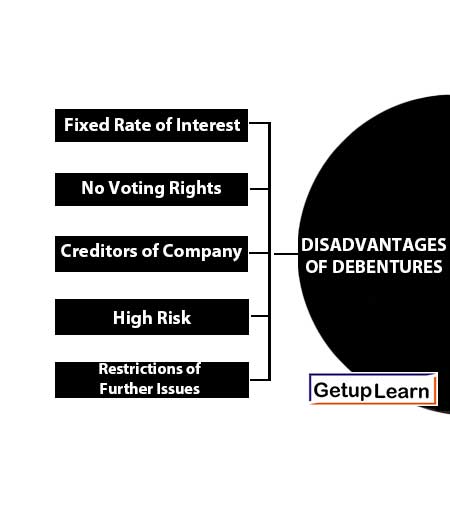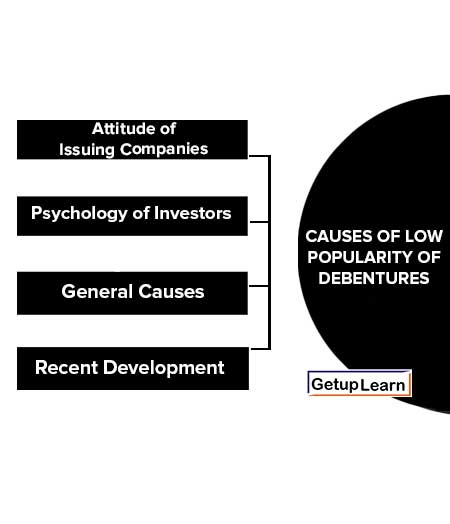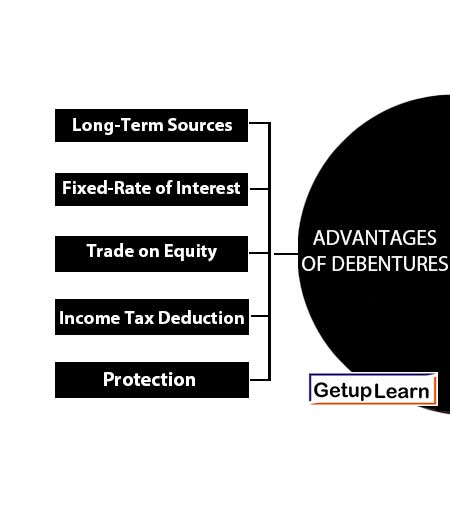Table of Contents
What is Debenture?
Debentures/bonds represent creditors’ security and debenture holders are long-term creditors of the company. As a secured instrument, it is a promise to pay interest and repay the principal at stipulated times. In contrast to equity capital, variable income security, debentures are fixed income (interest) security.

A Debenture is a document issued by the company. It is a certificate issued by the company under its seal acknowledging a debt. According to the Companies Act 1956, “debenture includes debenture stock, bonds and any other securities of a company whether constituting a charge of the assets of the company or not.”
Features of Debentures
These are features of debentures explained below:
- Trust Indenture
- No Voting Rights
- Fixed-Rate of interest
- Maturity
- Debenture Redemption Reserve (DRR)
- Call and Put Provision
- Security
- Convertibility
- Credit Rating
- Claim on Income and Assets

Trust Indenture
When a debenture is sold to investing public, a trustee is appointed through an indenture trust deed. It is a legal agreement between the issuing company and the trustee who is usually a financial institution/ bank/insurance company/firm of attorneys.
The trust deed provides the specific terms of the agreement such as the description of debentures, rights of debenture holders, rights of the issuing company, and responsibilities of the trustee, etc. The trustee is responsible to ensure that the borrower/company fulfills all its contractual obligations.
No Voting Rights
Debenture holders are considered creditors of the company. Hence they have no voting rights. Therefore, debenture holders cannot have control over the performance of the business concern.
Fixed-Rate of interest
Debentures yield a fixed rate of interest till the maturity period. Hence the business will not affect the yield of the debenture.
Maturity
It indicates the length of time for the redemption of par value. A company can choose the maturity period, though the redemption period for non-convertible debenture is typically 7-10 years. The redemption of debentures can be accompanied in either of two ways:
- Debentures redemption reserve (sinking fund)
- Call and put (buy-back) provision.
Debenture Redemption Reserve (DRR)
A DRR has to be created for the redemption of all debentures with a maturity period exceeding 18 months equivalent to at least 50 percent of the amount of issue/redemption before the commencement of redemption.
Call and Put Provision
The call/buyback provision provides an option for the issuing company to redeem the debentures at a specified price before maturity. The call price may be more than the part/face value by usually 5 percent, the difference being the call premium. The put option is a right to the debenture holder to seek redemption at a specified time at predetermined prices.
Security
Debentures are generally secured by a charge on the present and future immovable assets of the company by way of an equitable mortgage.
Convertibility
Apart from pure non-convertible debentures, debentures can also be converted into equity shares at the option of the debenture holders. The conversion ratio and the period during which conversion can be affected are specified at the time of the issue of the debenture itself. The convertible debentures may be fully convertible or partly convertible.
The FCDs carry interest rates lower than the normal rate on NCDs; they may even have a zero rate of interest. The PCDs have two parts:
- Convertible part, (b) non-convertible part. Typically, the convertible portion is converted into equity shares at a specified premium after a specified date from the date of allotment, while the non-convertible portion is payable/ redeemable in specified equal installments on the expiry of specified years from the date of allotment.
Credit Rating
To ensure timely payment of interest and redemption of principal by a borrower, all debentures must be compulsorily rated by one or more of the credit rating agencies.
Claim on Income and Assets
The payment of interest and repayment of principal is a contractual obligation enforceable by law. Default would lead to bankruptcy of the company. The claim of debenture holders on income and assets ranks paris passu with other secured debt and higher than that of shareholders-preference as well as equity.
Types of Debentures
Debentures may be straight debentures or convertible debentures. A convertible debenture is one which can be converted, fully or partly, into shares after a specified period of time. Thus on the basis of convertibility, the following are the types of debentures:
- Unsecured Debentures
- Secured Debentures
- Redeemable Debentures
- Irredeemable Debentures
- Non-Convertible Debentures
- Fully-Convertible Debentures
- Partly-Convertible Debentures
Unsecured Debentures
Unsecured debentures are not given any security on the assets of the company. It is also called simple or naked debentures. These types of debentures are treated as unsecured creditors at the time of winding up of the company.
Secured Debentures
Secured debentures are given security on assets of the company. It is also called a mortgaged debenture because these debentures are given against any mortgage of the assets of the company.
Redeemable Debentures
These debentures are to be redeemed on the expiry of a certain period. The interest is paid periodically and the initial investment is returned after the fixed maturity period.
Irredeemable Debentures
These kinds of debentures cannot be redeemable during the lifetime of the business concern.
Non-Convertible Debentures
Non-convertible debentures are pure debentures without a feature of conversion. They are repayable on maturity. The investor is entitled to interest and repayment of the principal.
Fully-Convertible Debentures
Fully-convertible debentures are converted into shares as per the terms of the issue with regard to price and time of conversion.
The pure Fully-convertible debentures interest rates are generally less than the interest rates on Non-convertible debentures since they have the attractive feature of being converted into equity shares. Recently, companies in India are issuing Fully-convertible debentures with zero rates of interest.
Partly-Convertible Debentures
A number of debentures issued by companies in India have two parts: a convertible part and a non-convertible part. Such debentures are known as partly-convertible debentures. The investor has the advantages of both convertible and non-convertible debentures blended into one debenture.
Advantages of Debentures
A debenture is one of the major parts of the long-term sources of finance of consisting the following important advantages of debentures:
Long-Term Sources
A debenture is one of the long-term sources of finance for the company. Normally the maturity period is longer than the other sources of finance.
Fixed-Rate of Interest
A fixed rate of interest is payable to debenture holders, hence it is most suitable of the companies to earn higher profits. Generally, the rate of interest is lower than the other sources of long-term finance.
Trade on Equity
A company can trade on equity by mixing debentures in its capital structure and thereby increasing its earning per share. When the companies apply the trade on equity concept, the cost of capital will reduce and the value of the company will increase.
Income Tax Deduction
Interest payable to debentures can be deducted from the total profit of the company. So it helps to reduce the tax burden of the company.
Protection
Various provisions of the debenture trust deed and the guidelines issued by the SEBI protect the interest of debenture holders.
Disadvantages of Debentures
Debenture finance consists of the following major disadvantages of debentures:
- Fixed Rate of Interest
- No Voting Rights
- Creditors of Company
- High Risk
- Restrictions of Further Issues

Fixed Rate of Interest
Debenture consists of a fixed rate of interest payable to securities. Even though the company is unable to earn a profit, they have to pay a fixed rate of interest to debenture holders; hence, it is not suitable for those company earnings which fluctuate considerably.
No Voting Rights
Debenture holders do not have any voting rights. Hence, they cannot have control over the management of the company.
Creditors of Company
Debenture holders are merely creditors and not the owners of the company. They do not have any claim in the surplus profits of the company.
High Risk
Every additional issue of debentures becomes more risky and costly on account of the higher expectations of debenture holders. This enhanced financial risk increases the cost of equity capital and the cost of raising finance through debentures which is also high because of high stamp duty.
Restrictions of Further Issues
The Company cannot raise further finance through debentures as the debentures are under the part of the security of the assets already mortgaged to debenture holders.
The key difference between a share and a debenture is that while a share represents part of the ownership of a company, a debenture acknowledges a loan or debt to the company.
Thus, a shareholder is a participant in the profits as well as losses of the company but a debenture holder is paid interest over the lifetime of the debenture and principal amount at the end of life.
The following table further differences between shares and debentures:
Differences Between Shares and Debentures
| Basis for Comparison | Shares | Debentures |
| Meaning | The shares are the owned funds of the company. | The debentures are the borrowed funds of the company. |
| What is it? | Shares represent the capital of the company. | Debentures represent the debt of the company. |
| Trust Deed | No trust deed is executed in the case of shares. | When the debentures are issued to the public, a trust deed must be executed. |
| Status of Holders | Owners | Creditors |
| Form of Return | Shareholders get the dividend. | Debenture holders get the interest. |
| Repayment in the event of winding up | Shares are repaid after the payment of all the liabilities. | Debentures get priority over shares, and so they are repaid before shares. |
| Voting Rights | The holders of shares have voting rights. | The holders of debentures do not have any voting rights. |
| Security for Payment | No | Yes |
| Holder | The holder of shares is known as a shareholder. | The holder of debentures is known as debenture holder. |
| Conversion | Shares can never be converted into debentures. | Debentures can be converted into shares. |
| Allowable Deduction | A Dividend is an appropriation of profit and so it is not allowed as a deduction. | Interest is a business expense and so it is allowed as a deduction from profit. |
| Quantum | A dividend is an appropriation of profit and so it is not allowed as a deduction. | Interest on debentures is a charge against profit. |
| Payment of Return | A dividend on shares is an appropriation of profit. | Interest can be paid to debenture holders even if there is no profit. |
Causes of Low Popularity of Debentures in India
Some of the reasons for the unpopularity of debentures finance and recent developments in a company are:

Attitude of Issuing Companies
Indian Companies are also considered very reluctant to depend on debentures finance, though it is an attractive source. The following are the main reasons for their hesitation:
- High Stamp Duty
- The Attitude of the Bankers
- Managing Agency System
- Absence of Issue House
High Stamp Duty
The cost of raising capital through debentures has become very high due to the high stamp duty.
The Attitude of the Bankers
The Indian bankers are very reluctant to provide financial assistance to companies that have debentures in their capital structure. Such companies are not looked favorably by the banks in the matter of accommodation.
Managing Agency System
The managing agents met the medium-term requirement through inter-corporate investments so as to maintain their financial dominance. However, this reason now has no validity because the system of managing agents had been abolished in 1968.
Absence of Issue House
The capital market in our country is not developed sufficiently. The number of issue houses and underwriting agencies is also very much limited. Hence, companies cannot depend on debenture finance because the marketing of debentures is also very uncertain.
Psychology of Investors
The attitude of the investors is not also in favor of debentures. There are a number of reasons for the growing reluctance on the part of investors to invest their funds in debentures. Some of the main causes are given below:
- Financial Institutions
- Face Value of Debentures
- Terms of Issue
Financial Institutions
Institutional investors generally prefer only debentures because of the reduced risk and increased certainty and stability of return.
But in our country, most of the institutional investors are public sector institutions. They have to invest a major portion of their funds in Government securities because of the statutory requirements.
Face Value of Debentures
The face value of the debentures is generally high like Rs. 1000 each or Rs. 500 etc. Therefore, moderate investors are not in a position to purchase such debentures.
Terms of Issue
Debentures are not generally issued with attractive terms, the services of debenture trustees are not available and the debentures cannot be converted into cash quickly. In contrast to our conditions, in the U.S.A., corporations are issuing bonds with highly attractive terms.
The bondholders also have a number of rights and powers. Such powers are not conferred on them in our country. Sometimes, they are also given the option to convert their debentures into shares.
General Causes
Besides the reasons cited above, there are also certain other general reasons which make debenture finance unpopular. Some of them are given below:
- Absence of Services of Debenture Trustees
- Nature of Capital Market
- Presence of Rival Securities
- Presence of Rival Securities
Absence of Services of Debenture Trustees
The importance of the trustees cannot be overstressed in making the debentures more popular. Their services are inevitable to safeguard the interest of the debenture holders. Such services are not available to the debenture holders in India.
Nature of Capital Market
The Indian capital market is also highly unorganized and less developed. There is no ready market for debentures. The industrial and fiscal policies of the Government are not also stable.
Presence of Rival Securities
Due to the presence of rival securities like gilt-edged securities of the Government and preference shares in the capital market, the demand for debentures is also affected very seriously.
Recent Development
Debentures are now becoming a more popular form of security due to the concrete measures taken by the Government. The Public Companies, Commercial Banks etc., are partially responsible for this development.
The reasons for the recent development are the following:
- The attitude of the commercial banks has been revised.
- Debentures are now issued with increasingly attractive terms.
- Due to relaxation in the statutory restrictions, institutional investors feel encouraged to invest more in company debentures.
- Companies under the same management now make joint issues by offering more securities. Hence, debentures are now more secure than before.
- Trustee services are now made available. According to the norms for the debenture issue announced on 14th January 1987, the appointment of debenture trustees is made compulsory in the case of certain companies.
- The development of issue houses and underwriting firms also enhanced the liquidity and marketability of the debentures.
- Payment of interest on debentures is now an admissible deduction under Income Tax Act. This allowance made many companies opt for debenture finance at least to avoid tax.
- Thus, the debentures no longer carry the stigma attached to them earlier. This, in fact, is a welcome development in the Indian Capital Market.
FAQs About What is Debenture?
What is the meaning of debenture?
A Debenture is a document issued by the company. It is a certificate issued by the company under its seal acknowledging a debt. According to the Companies Act 1956, “debenture includes debenture stock, bonds and any other securities of a company whether constituting a charge of the assets of the company or not.”
What are the features of debentures?
The features of debentures are:
1. Trust Indenture
2. No Voting Rights
3. Fixed-Rate of interest
4. Maturity
5. Debenture Redemption Reserve (DRR)
6. Call and Put Provision
7. Security
8. Convertibility
9. Credit Rating
10. Claim on Income and Assets.
What are the types of debentures?
There serval types of debentures some of given below:
1. Unsecured Debentures
2. Secured Debentures
3. Redeemable Debentures
4. Irredeemable Debentures
5. Non-Convertible Debentures
6. Fully-Convertible Debentures
7. Partly-Convertible Debentures.
What are the advantages of debentures?
The following are the advantages of debentures:
1. Long-Term Sources
2. Fixed-Rate of Interest
3. Trade on Equity
4. Income Tax Deduction
5. Protection.
What are the disadvantages of debentures?
The disadvantages of debentures are explained below:
1. Fixed Rate of Interest
2. No Voting Rights
3. Creditors of Company
4. High Risk
5. Restrictions of Further Issues.




